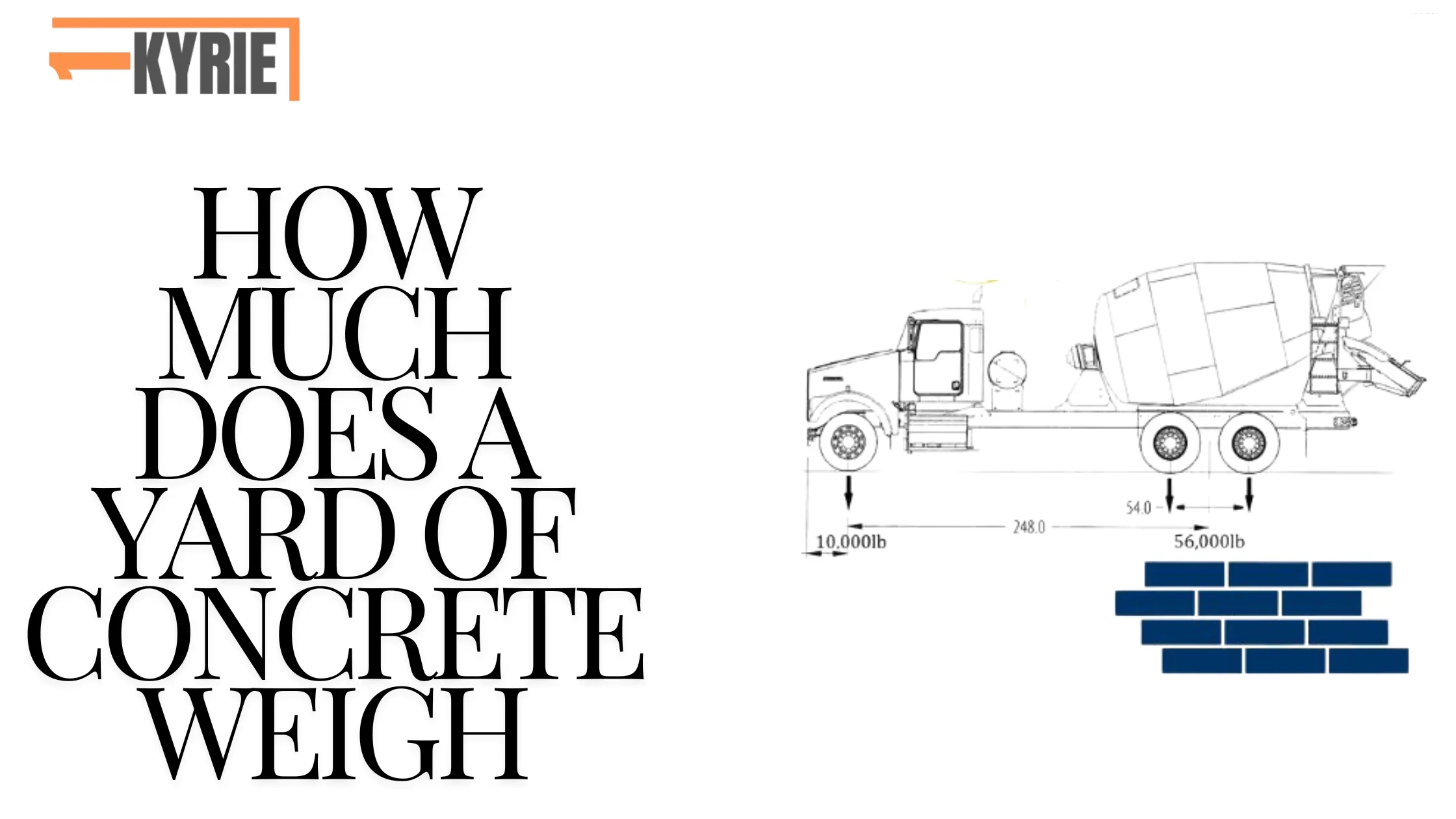Table of Contents
Concrete is one of the most common building materials in the world, but have you ever wondered how much does a yard of concrete weighs? Whether you’re planning a construction project or just curious, understanding the weight of concrete can be essential for several reasons, including transportation and application. In this article, we’ll dive into the details of concrete weight, why it matters, and some shocking facts you must know. Let’s break it down in simple, easy-to-understand terms.
What is a Yard of Concrete?

Before answering the question, “How much does a yard of concrete weigh?” let’s first understand what we mean by a “yard of concrete.” A yard of concrete refers to one cubic yard, which is a standard unit of measurement in the construction industry. It measures a block of concrete 3 feet long, 3 feet wide, and 3 feet deep. This helps contractors and homeowners plan for concrete projects, knowing how much material they need.
Why Use a Yard as a Measurement?
A cubic yard is used because it can quickly calculate large quantities for projects like foundations, driveways, or patios. This unit of measurement allows for a more straightforward conversion to truckloads and is efficient for transporting large amounts of concrete.
How Much Does a Yard of Concrete Weigh?

The weight of a concrete yard is essential for determining how much you’ll need for a project and how you’ll transport it. So, how much does a yard of concrete weigh?
Standard Weight of a Yard of Concrete
A concrete yard typically weighs around 4,000 pounds (or 2 tons). This weight includes the cement, water, sand, gravel, and other additives that make up the concrete mix. The concrete density can vary slightly, depending on the mix, but the 4,000-pound estimate is a reliable rule of thumb.
Why is Concrete So Heavy?
Concrete is made from dense materials like gravel, sand, and cement, all of which add to its weight. Water is also a vital part of the mix, contributing to the weight as it binds the components together. Once the water evaporates during the curing process, the concrete remains incredibly dense, resulting in a hefty material that can handle significant loads.
Factors That Affect Concrete Weight
Although 4,000 pounds is the standard, how much does a yard of concrete weigh can vary slightly based on several factors. Let’s explore what might influence the weight of concrete.
1. Concrete Mix Type
Different concrete mixes can affect the overall weight. For instance, lightweight concrete might weigh less than standard concrete due to specific additives or less dense materials like perlite or vermiculite.
2. Moisture Content
The amount of water in the concrete mix affects its weight. Because of the added water content, wet concrete weighs more than dry concrete. As the water evaporates during the curing process, the concrete becomes lighter but never loses its density entirely.
3. Aggregate Materials
Concrete is made from a mixture of different aggregate materials, such as gravel, sand, and crushed stone. If heavier materials are used, the overall weight of the concrete will increase. Lightweight aggregates like pumice or expanded shale can reduce the weight slightly but not drastically.
4. Additives and Reinforcements
In some cases, additional materials like steel rebar, fibers, or other additives are included to reinforce the concrete. Depending on their composition and the quantity used, these materials can slightly alter the weight.
Why is Knowing the Weight of Concrete Important?

Knowing how much does a yard of concrete weigh is more than just an interesting fact—it has practical uses, especially in the construction industry. Let’s explore why this information is so valuable.
1. Transportation
Concrete is heavy, and transporting it requires specialized trucks and equipment. Concrete mixers must consider the weight limits of their vehicles and roads when transporting large amounts of concrete. If the weight exceeds capacity, it can lead to transportation issues or even legal problems if overloaded cars are used.
2. Structural Integrity
Understanding the weight of concrete is crucial when designing structures. The foundation and support systems must be strong enough to handle the weight of the concrete. Otherwise, the entire structure may be at risk of collapse or failure.
3. Cost Calculations
Concrete is typically sold by the cubic yard, and knowing the weight can help calculate transportation costs and labor. Heavier loads may require more equipment or time to manage, impacting the total cost of a project.
Surprising Facts About Concrete Weight
Now that we’ve covered the basics, let’s dive into some surprising facts you may not know about how much does a yard of concrete weigh.
1. Concrete Gets Lighter Over Time
While concrete is heavy initially, it loses weight as it cures. Depending on environmental factors, this process can take several days or even weeks. As water evaporates from the mix, the overall weight decreases slightly, but the concrete remains strong and durable.
2. Lightweight Concrete Exists
In some cases, particular types of concrete are designed to be lighter for specific applications. Lightweight concrete can weigh around 3,000 pounds per yard, about 25% less than standard concrete. It is commonly used in roofing, insulation, or non-load-bearing walls.
3. The Heaviest Concrete Projects
Some of the heaviest concrete structures in the world include dams, bridges, and skyscrapers. For example, the Hoover Dam contains over 4.36 million cubic yards of concrete, making it one of the largest and heaviest concrete projects ever constructed.
Also Read: How Much Does an Exterminator Cost? Shocking Prices Revealed!
How to Calculate the Weight of Concrete for Your Project
If you’re planning a concrete project and need to know the exact weight, here’s a simple way to calculate it.
- Measure the Area – Determine the length, width, and depth of the concrete area where you will pour. Multiply these three numbers together to get the cubic yards.
- Multiply by Weight – Multiply the total cubic yards by 4,000 pounds to estimate the total weight of the concrete required.
- Consider Additional Factors—The type of concrete mix, moisture content, and reinforcements could affect the final weight.
How much does a yard of concrete weigh? On average, a yard of concrete weighs around 4,000 pounds or 2 tons. However, this number can vary slightly depending on the type of mix, moisture content, and additives used. Knowing the weight of concrete is essential for transportation, cost calculations, and ensuring the safety and stability of construction projects. Whether you’re a contractor or a curious homeowner, understanding these shocking facts about concrete weight can help you make informed decisions for your next project.
By keeping these factors in mind, you’ll be well-prepared for any project and know exactly how much does a yard of concrete weigh, helping you plan for transportation, costs, and structural needs.

